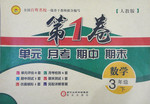题目内容
---How is Tom doing?
---_________.
A. He is a doctor B. Great
C. He is having lunch D. He's my brother
练习册系列答案
 第1卷单元月考期中期末系列答案
第1卷单元月考期中期末系列答案
相关题目
题目内容
---How is Tom doing?
---_________.
A. He is a doctor B. Great
C. He is having lunch D. He's my brother
 第1卷单元月考期中期末系列答案
第1卷单元月考期中期末系列答案